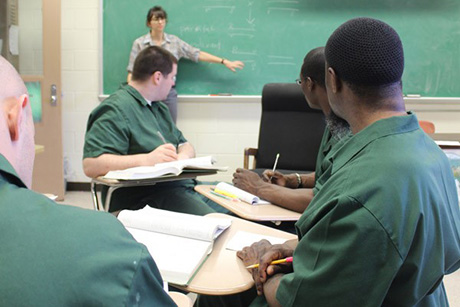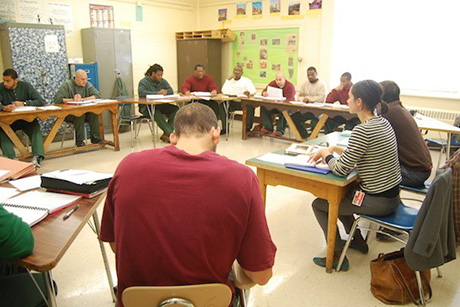Prison education program to expand with Mellon grant
By Daniel Aloi


The Cornell Prison Education Program (CPEP) plans to expand to provide classes and degree programs in four regional prisons, establish a consortium of regional colleges and universities participating in prison education, and create a model college-in-prison network in the region with support from a $1 million, three-year grant from The Andrew W. Mellon Foundation.
“Our vision would see all prisons in the area with a college presence facilitated by Cornell University,” said Vice Provost Judith Appleton, who prepared the proposal to the Mellon Foundation with CPEP Director Rob Scott.
Working with the New York State Department of Corrections and Community Supervision, the program currently offers humanities and liberal arts courses to qualified incarcerated students at the Auburn and Cayuga correctional facilities. Sixty Cornell faculty members, graduate students and undergraduates are serving as instructors and teaching assistants this semester alone. Graduate instructors receive a stipend, and the program provides all course materials for incarcerated students.

“We’re growing at a time when much of the country is turning its attention to criminal justice reform. Cornell’s program is a positive example of a project for change – we’re creating a constructive pathway away from prison: getting an education,” Scott said.
The initiative will expand CPEP’s course offerings and instructional staff; develop and implement an associate degree program at Five Points Correctional Facility in 2016; and potentially launch a pilot program at the Elmira Correctional Facility by 2017.
“There are four adult prisons [in the region] that are eligible for programs such as ours,” Scott said. “We’ve been in Auburn for more than a decade and Cayuga for eight years. We hope to build a higher education initiative from scratch at Elmira; there’s nothing there currently.”
CPEP partners with Cayuga Community College to offer an Associate in Arts degree at Auburn, and anticipates collaborating with Hobart and William Smith Colleges, which has had a volunteer-led teaching initiative at Five Points. “It’s not currently a degree-granting program. The Mellon grant we received is targeted specifically to that,” Scott said.
At Auburn, 30 inmates have earned associate degrees through CPEP at graduation ceremonies in summer 2012 and winter 2014.
“We will be leading the drive to bring higher education back to the prison system,” Scott said. “There were programs across the state in the ’80s and ’90s, with institutions like Syracuse University and community colleges involved.”
The Violent Crime Control and Law Enforcement Act of 1994 made prisoners ineligible for financial aid, and New York state denied the Tuition Assistance Program to prisoners in 1995. “Pretty much overnight, a large number of college-in-prison programs disappeared,” Scott said.
“We’re trying to show we are a serious program in the corrections system. We’re going to reach a large number of people,” he said. “We will effectively double our current level of activity – double the number of courses from about 30 to 60 per year, and double the number of people involved by the end of 2017, when the Mellon-funded project will be fully configured.”
The CPEP expansion plans have a number of synergies with initiatives at Cornell, including the Institute for the Social Sciences’ three-year theme project on mass incarceration and the Central New York Humanities Corridor, an academic consortium of regional colleges and universities also funded by Mellon. A proposed interdisciplinary minor in crime, prisons and justice, highlighted by student participation in CPEP, recently received curriculum development funding from Engaged Cornell.
Media Contact
Get Cornell news delivered right to your inbox.
Subscribe